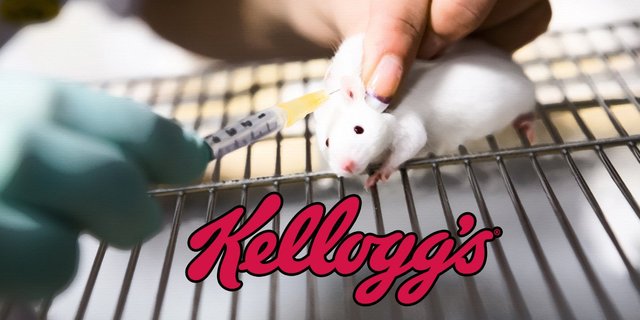Kellogg’s Ends Animal Testing After 65 Years

The food giant Kellogg recently announced that they will be stopping the use of animal testing for their products, and officially changing their policy on the matter. The company has used animals for testing purposes for the past 65 years to establish questionable human health claims for its food products and ingredients. Kellogg’s use of animal testing has been in the news since 2007, when People for the Ethical Treatment of Animals (PETA) publicly asked the company to stop the practice.
In response to the initial criticism that Kellogg received, the company said that they would stop testing on animals by 2025.
Luckily, ongoing negotiations with animal rights activists have prompted Kellogg to stop the testing immediately. According to the company’s new “Animal Welfare Commitment”: “Kellogg does not conduct, fund, support or condone the use of animal testing for food products or ingredients” beyond what is explicitly require(d) by governmental agencies for food safety or quality.”
The commitment also indicated that the company supports “replacing animal testing with other validated methods.”
However, the announcement came with the caveat that testing will continue in circumstances where it is required by government.
“Only when governmental agencies explicitly require animal testing to demonstrate safety or quality are studies conducted by accredited third-party facilities that follow proper animal welfare guidelines. We do not maintain any testing facilities,” the statement said.
Kris Bahner, senior vice president of global corporate affairs at Kellogg, insists that the company rarely tested on animals in recent years, and that this new statement is merely a reflection of “practices that have been in place for several years.”
“The overwhelming majority of the Kellogg Company portfolio is plant-based. We had not included animal testing in the Animal Welfare Commitment prior as the frequency of testing is so rare, but understand reiterating our approach publicly is helpful to stakeholders,” Bahner said in a statement to Battle Creek Enquirer.
However PETA says that Kellogg was involved with at least 1273 animal experiments on rats and hamsters between 1995 to 2016. According to PETA Vice President Shalin Gala, Kellogg had no public policy on animal testing until just a few months ago, when they released their Animal Welfare Commitment.
“The global food industry is recognizing that no marketing claim can possibly excuse force-feeding, poisoning, suffocating, and killing gentle rats in cruel and deadly tests. The Kellogg Company is no longer a cereal killer of animals in deadly tests, and PETA applauds the company’s decision to embrace superior, non-animal research methods,” Gala said in a statement.
Kellogg joins a number of other major multinational corporations that PETA has worked with to stop animal testing, including The Coca-Cola Company, General Mills and Welch’s. It is estimated that around 50–100 million vertebrate animals are used in experiments annually. However, those figures do not include invertebrates such as shrimp and fruit flie.
PETA have now turned their attention to the University of Delaware, where experimenter Tania Roth conducts cruel tests on vulnerable, sensitive rats, claiming to study child abuse. They have set up a petition so people can help with their campaign.
They'll do the testing on humans. That's more ethical.
Curated for #informationwar (by @Gregorypatrick)
Ways you can help the @informationwar!
To listen to the audio version of this article click on the play image.

Brought to you by @tts. If you find it useful please consider upvoting this reply.
Certainly an awesome development and your article is well-delivered.
I wonder what it will do for these companies to fully reinstate the public's trust in them (by people who already care about things). Don't think it's ever going to happen fully but I guess we gotta start somewhere ;)
By 2025? So they get public accolades now for a policy change that doesn't even take effect for 6 years (and could very well be cancelled if this takes pressure off them now)? How is this not recognized as the animal rights equivalent of 'greenwashing'?
Thanks to @paradigmprospect, this post was resteemed and highlighted in today's edition of The Daily Sneak.
Thank you for your efforts to create quality content!